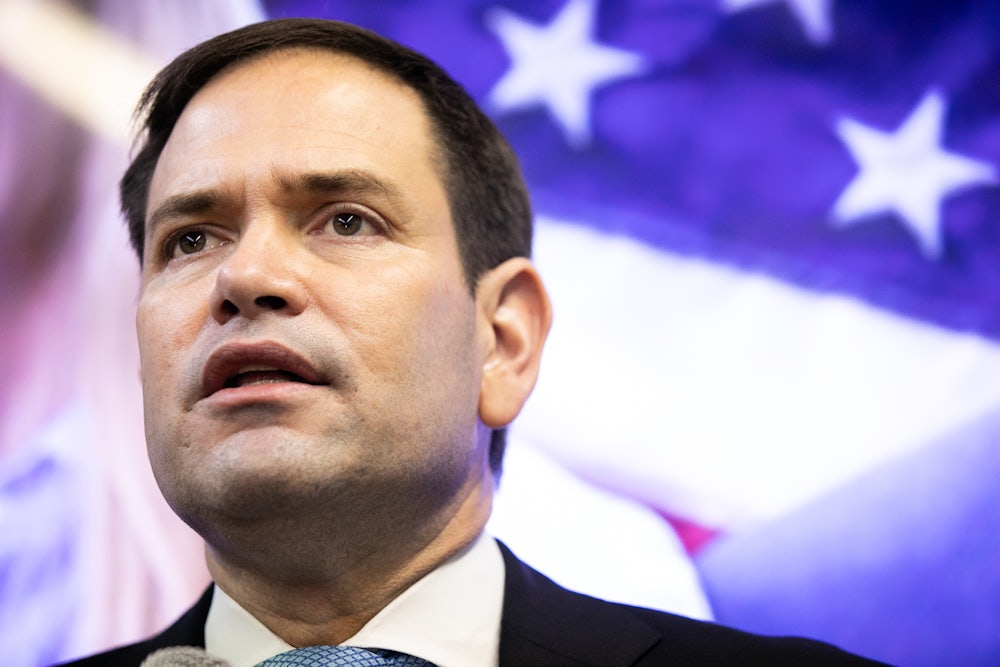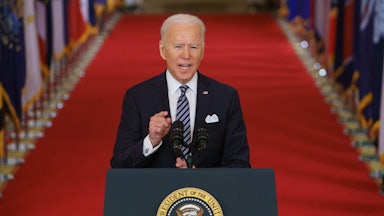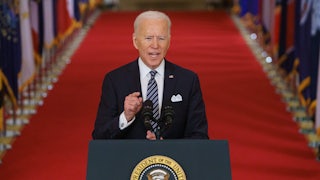Amazon has become so obviously villainous that even Republican politicians like Florida Senator Marco Rubio are now supporting the worker unionization effort in Bessemer, Alabama. Or at least, that’s what Rubio would like readers of a bizarre new USA Today op-ed to think.
“For the past several years, Amazon has waged a war against working-class values,” wrote Rubio, before clarifying that these working-class values include support for conservative books and “traditional charities.” What follows is a culture-war broadside draped in the language of labor activism, showing more concern about supposedly woke H.R. departments than the dangerous conditions facing warehouse workers. If this bad-faith, reactionary approach to labor rights is how Republicans aim to become a working-class party, as some of its members hope, then they have a long way to go.
Throughout his op-ed, Rubio displays the sort of willfully myopic perspective that can only come from a politician pushing his own agenda. “It isn’t clear whether the union effort is primarily driven by complaints from its workers, agitation from Democratic operatives, or just the fact that Jeff Bezos has now become the first person in history worth $200 billion,” he writes—as if it were impossible to find out and not a well-chronicled fact that Amazon workers face demanding, harsh conditions, and low pay while Bezos ascends to new stratospheres of wealth. But Rubio’s piece is filled with these awkward acts of rhetorical hedging, lest he be caught in the embarrassment of being an authentic union supporter.
In Rubio’s view, unions aren’t desirable—they make otherwise peaceful labor relations “adversarial”—but Amazon deserves the trouble because it has become a tool of the liberal American establishment. The company imposed “progressive values” on all of us—how and when, Rubio doesn’t quite make clear—and now it’s reaping the backlash. Rubio, in short, supports the Amazon union out of a politics of spite, not because he wishes to ensure workers’ core material interests in a time of radical, and sometimes deadly, inequality.
As commentators have pointed out, one of the best things Rubio could do to promote workers’ interests would be to vote in favor of the Protecting the Right to Organize Act, which recently passed the House of Representatives on a mostly party-line vote. The PRO Act is seen by advocates as a pro-worker measure that strengthens union organizing and worker protections while prohibiting the kind of company interference that Amazon has been accused of. President Biden supports the bill, which he said will help “summon a new wave of worker power.” As of now, the PRO Act is likely to die in the Senate, a victim of the filibuster.
But Rubio and most of his fellow Republicans have no interest in genuinely supporting unions because they have no interest in improving voters’ material lives. As shown by ridiculous debacles over Dr. Seuss and Mr. Potato Head (I feel dumber just writing this), Biden-era Republicans will be content to stoke useless culture wars to generate attention, air time, and donations. About this, Rubio was very clear: “When the conflict is between working Americans and a company whose leadership has decided to wage culture war against working-class values, the choice is easy—I support the workers,” he said. “And that’s why I stand with those at Amazon’s Bessemer warehouse today.”
Workers hopefully will see this for the cheap—and insulting—ruse it is. They know where their concerns lie. Relationships between labor and ownership are inherently adversarial, especially at one of the world’s most powerful companies; it is naïve, if not deliberately misleading, to claim otherwise. And it is equally deceptive not to recognize the obvious: that workers organize because they are struggling and because unionization brings better conditions and higher pay, not because they’re angry about Amazon allegedly suppressing conservative books.
However clumsy his positioning, Rubio is opening an interesting door. Even before Covid-19 wrecked the economy and exacerbated record inequality, America’s new gilded age was becoming impossible for politicians to ignore. In September, a collection of conservative luminaries, including Marco Rubio, published a statement headlined “Conservatives Should Ensure Workers a Seat at the Table.” While hardly friendly to unions, which it accused of corruption and ignoring workers’ needs, the statement nodded to efforts like allowing workers a seat on corporate boards and collective bargaining (which, in typical conservative spin, the statement described as a way to challenge “government mandates”). The problems with monopolistic companies gouging workers had become too glaring for even corporatist Republicans to ignore, though the attention they’ve come to pay these issues is worthless.
None of this is to say that conservatives will be supporting substantive pro-union measures any time soon (only five Republican members of the House voted in favor of the PRO Act). Amazon makes for a convenient enemy for Republicans, who exhibit only opportunistic concern for workers. But if Republicans keep talking about being a party of workers, however specious and self-serving their arguments, they may eventually have to do something beyond falling back on tired culture-war rhetoric. The macabre political achievement of Republicans in recent decades has been to convince millions of working-class Americans to vote against their own material interests. By coming out in favor of the Bessemer union drive, Rubio at least signals that there’s a problem here. What he may not realize is that the problem—a profound indifference to advancing workers’ interests—is a feature of the modern Republican Party as much as it is of Amazon. In the end, Americans might be more forgiving of Amazon. At least the company has something to offer them.








